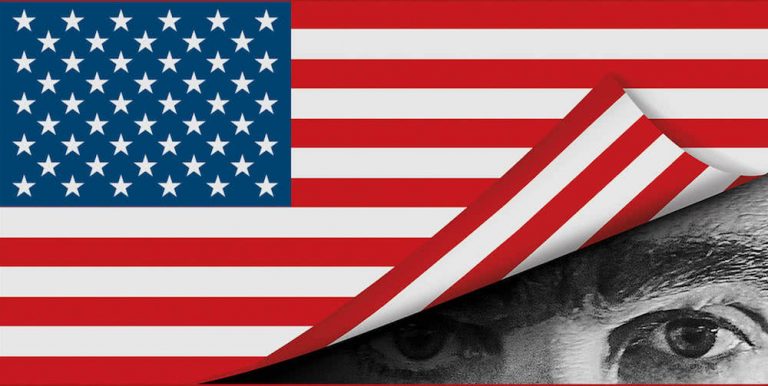President Donald Trump once appeared on Da Ali G Show for about two minutes. In the segment, Ali G tries to convince Trump to invest in a product called the ice-cream glove, designed to prevent drips from getting on your hand. Visibly unimpressed, Trump barely makes it through the opening pitch before handing back his mic and walking off. Nearly a decade later he would tweet, quote: ”I never fall for scams. I am the only person who immediately walked out of my ‘Ali G’ interview.”
Sacha Baron Cohen made a name for himself by trading in the quintessentially English trait: civility. His thesis – that most people, most of the time, would be polite long enough for him to poke at their prejudices and get them to say awful things.
Watch a clip from Who Is America below
The only flaw in his model was to underestimate just how well it would work. Ali G, Borat, and Bruno were outsiders, with just enough cultural coding for people not to get suspicious. This presumption of innocence stopped working once his characters became icons in their own right. Then – and this is not a coincidence – the rich and powerful became very willing to be seen with him. To be mocked just enough so as to appear in on the joke. Cohen, thankfully, allowed those characters to retire.
Sacha Baron Cohen made a name for himself by trading in the quintessentially English trait: civility.
At its best, Cohen’s work took great pleasure in breaking the veneer of respectability – particularly among England’s upper classes. That people with titles and little piles of acronyms at the end of their names would be so willingly racist, homophobic, and anti-Semitic remains shocking. What’s unfortunate is that society at large doesn’t seem to care.
Love Music?
Get your daily dose of metal, rock, indie, pop, and everything else in between.
In 2018, comedy is itself a veneer, an interactive barrier to social justice used for cynical ends. Police departments hire people to adapt memes; Nazis use image-board culture to recruit and maintain a viable market share. President Obama once responded to the Bush-era torture program, saying ‘We killed some folks’.
The uncomfortable truth, pointed then and ubiquitous now, is that none of this really matters. At least, not in the way people seem to want it to. The promotional run up to Who Is America? featured some prominently aggrieved Republicans, which was presumably good for ratings but barely qualifies as novel. Take Trump at his word and all it demonstrates is his addiction to publicity. If he’s a liar, then he’s a not-particularly-bright asshole who is addicted to publicity. It’s no less embarrassing than being handed a soccer ball like some neglected stepchild. Either way, he’s still the President.
Police departments hire people to adapt memes; Nazis use image-board culture to recruit and maintain a viable market share.
Who Is America? feels immediately grotesque. Cohen’s disguises are far more elaborate, in part by necessity, the rubbery jowls and comical brows adding to the Grand Guignol atmosphere. The first episode’s final and most successful piece features Erran Morad, an Israeli anti-terrorism expert. As a character Morad is his smartest creation, representative of America’s Greatest Ally, while being just enough of outsider to string them along. As gun lobbyists spruik deadly weapons designed for small children, spokesmen of the right complain of organised conspiracy – but their outrage is all part of the act. What they implicitly understand, but can’t seem to say out loud, is that this is just how things work now.
Everyone has a choir with which to preach. Any criticism or embarrassment, no matter how truthful or damning it might be, is just more evidence of their unfair persecution. His elaborate pranks will be part of the news cycle, and things will be keep on going as they were. This is not a criticism of Cohen, who can still wield shock like few others on television, but of our collective desire for television to matter. Nobody is going to jail, but at least there’ll be some good jokes along the way.


































